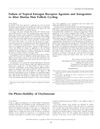 9 citations,
February 2019 in “BMC cancer”
9 citations,
February 2019 in “BMC cancer” M30 is a promising treatment for preventing hair loss during chemotherapy.
 9 citations,
August 2015 in “Tissue Engineering and Regenerative Medicine”
9 citations,
August 2015 in “Tissue Engineering and Regenerative Medicine” Human skin cell byproducts can potentially be used to treat hair loss and promote hair growth.
 9 citations,
August 2005 in “Experimental Dermatology”
9 citations,
August 2005 in “Experimental Dermatology” Modified pep7, named EPM peptide, effectively promotes hair growth at low concentrations and works well with minoxidil.
 8 citations,
April 2020 in “Journal of Ethnopharmacology”
8 citations,
April 2020 in “Journal of Ethnopharmacology” Herbs might help with hair loss, but more research is needed to confirm their safety and effectiveness.
 8 citations,
September 2017 in “Journal of Natural Medicines”
8 citations,
September 2017 in “Journal of Natural Medicines” Applying an extract from Perilla frutescens helps hair grow and fights the effects of hair loss hormones.
8 citations,
April 2016 in “Experimental dermatology” B6.Cg-Tyr c−2J Hr hr /J mice have a stronger delayed sunburn reaction and are good for UV research.
 8 citations,
January 2016 in “Evidence-based Complementary and Alternative Medicine”
8 citations,
January 2016 in “Evidence-based Complementary and Alternative Medicine” Rumex japonicus extract may promote hair growth more effectively than Minoxidil.
8 citations,
April 2012 in “Korean journal of medicinal crop science/Han-gug yagyong jagmul hag-hoeji” Rosa multiflora root extract promotes hair growth and prevents hair loss.
 6 citations,
January 1998 in “Journal of Investigative Dermatology”
6 citations,
January 1998 in “Journal of Investigative Dermatology” Estrogen receptors may not affect mouse hair growth as previously thought, and oxybenzone in sunscreen is stable in sunlight.
 4 citations,
March 2018 in “Daehan han'yi hag'hoeji/Journal of Korean medicine”
4 citations,
March 2018 in “Daehan han'yi hag'hoeji/Journal of Korean medicine” Astragalus membranaceus helps regrow hair and reduce hair loss symptoms.
 4 citations,
June 2011 in “Journal of Biomedical Research”
4 citations,
June 2011 in “Journal of Biomedical Research” Herbal extracts promoted hair growth similar to minoxidil in mice.
4 citations,
October 2009 in “Saengmyeong gwahag hoeji/Saengmyeong gwahak hoeji” Purified wood vinegar can safely and effectively promote hair growth.
 3 citations,
May 2018 in “InTech eBooks”
3 citations,
May 2018 in “InTech eBooks” Animal models, especially mice, are essential for advancing hair loss research and treatment.
 3 citations,
November 2011 in “European Journal of Dermatology”
3 citations,
November 2011 in “European Journal of Dermatology” 4-O-methylhonokiol from Magnolia officinalis significantly promotes hair growth.
3 citations,
September 2011 in “Daehan miyong hakoeji” Dansam-Samultang promotes hair growth and prevents hair loss.
 2 citations,
November 2022 in “BioMed Research International”
2 citations,
November 2022 in “BioMed Research International” Baicalin may help treat hair loss by promoting hair follicle growth and activating specific cellular pathways.
 2 citations,
August 2022 in “Korean journal of medicinal crop science/Han-gug yagyong jagmul hag-hoeji”
2 citations,
August 2022 in “Korean journal of medicinal crop science/Han-gug yagyong jagmul hag-hoeji” BLH308, made from persimmon leaf, green tea, and sophora fruit, may help reduce hair loss by fighting oxidative stress and inflammation.
2 citations,
March 2020 in “Developmental cell” Stress can cause hair to turn gray by depleting pigment-producing cells through the release of a stress hormone.
2 citations,
November 2019 in “PubMed” Henna significantly promotes hair growth and reduces androgen levels in mice with alopecia.
 2 citations,
June 2016 in “Journal of Applied Biological Chemistry”
2 citations,
June 2016 in “Journal of Applied Biological Chemistry” Glycine soja extract stimulates hair growth and could help treat hair loss.
 1 citations,
August 2023 in “Expert opinion on drug delivery”
1 citations,
August 2023 in “Expert opinion on drug delivery” Cedrol-loaded microneedles effectively promote hair growth.
1 citations,
February 2016 in “Cell Transplantation” Hair follicles have a more inactive cell cycle than other skin cells, which may help develop targeted therapies for skin diseases and cancer.
 1 citations,
March 2015 in “Journal of Visualized Experiments”
1 citations,
March 2015 in “Journal of Visualized Experiments” Researchers developed a new, precise method to measure hair loss in mice using image analysis.
 1 citations,
November 2008
1 citations,
November 2008 Yonnyuniksoogobon-dan taken orally promotes hair growth by affecting growth factors in hair roots.
 January 2025 in “bioRxiv (Cold Spring Harbor Laboratory)”
January 2025 in “bioRxiv (Cold Spring Harbor Laboratory)” Rhamnose may help hair growth and pigmentation, making it a potential treatment for hair loss.
 September 2024 in “International Journal of Molecular Sciences”
September 2024 in “International Journal of Molecular Sciences” Hydrangea serrata extract may promote hair growth and improve hair health.
September 2024 in “Colloids and Surfaces B Biointerfaces” Cedrol nanoemulsions effectively treat hair loss by promoting hair growth and reducing DHT levels safely.
August 2024 in “Pharmaceuticals” Oral sturgeon oil promotes hair growth and improves gut health.
 April 2024 in “Cellular signalling”
April 2024 in “Cellular signalling” Activating TRPMLs helps human cells important for hair growth and increases hair growth in mice.
 December 2023 in “Journal of Trace Elements in Medicine and Biology”
December 2023 in “Journal of Trace Elements in Medicine and Biology” Molybdenum nanoparticles could be a new treatment for hair loss, working differently than minoxidil.





















